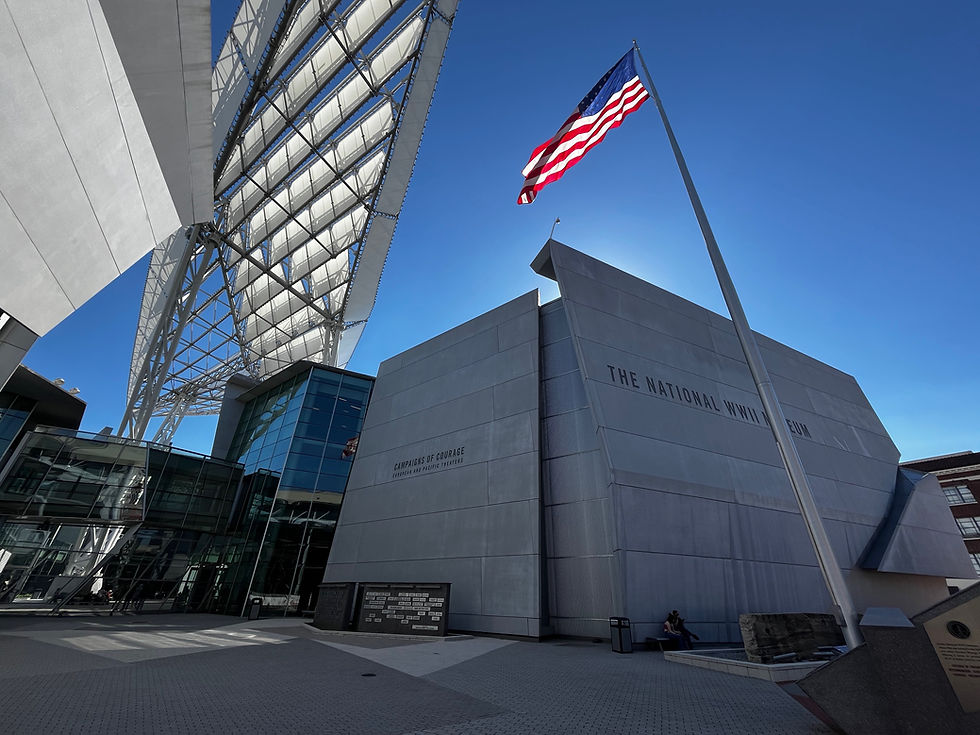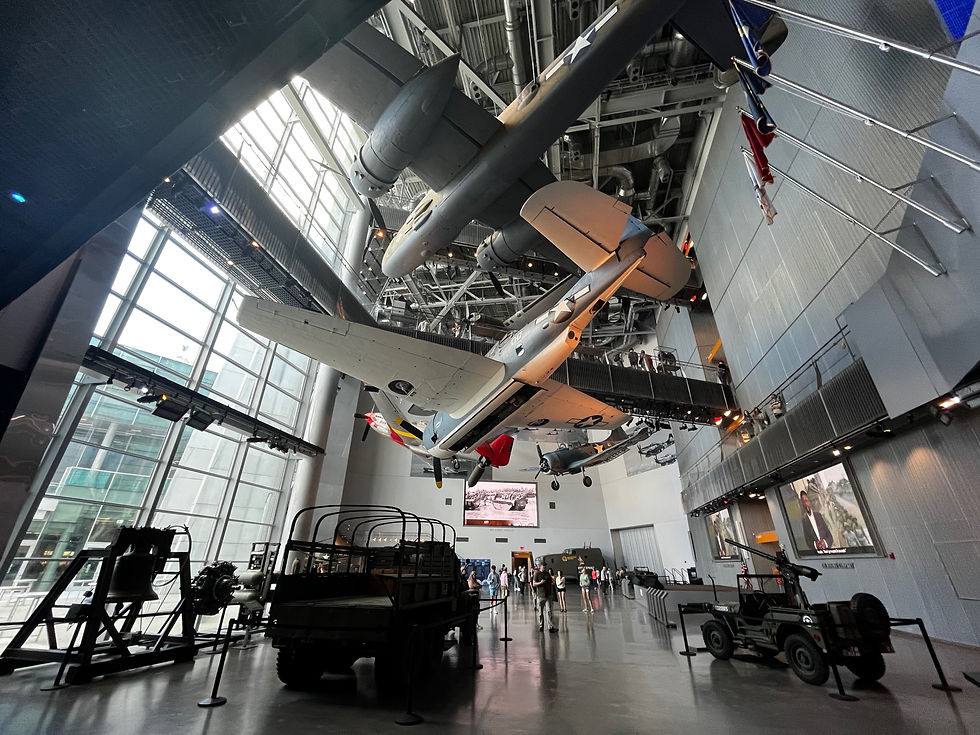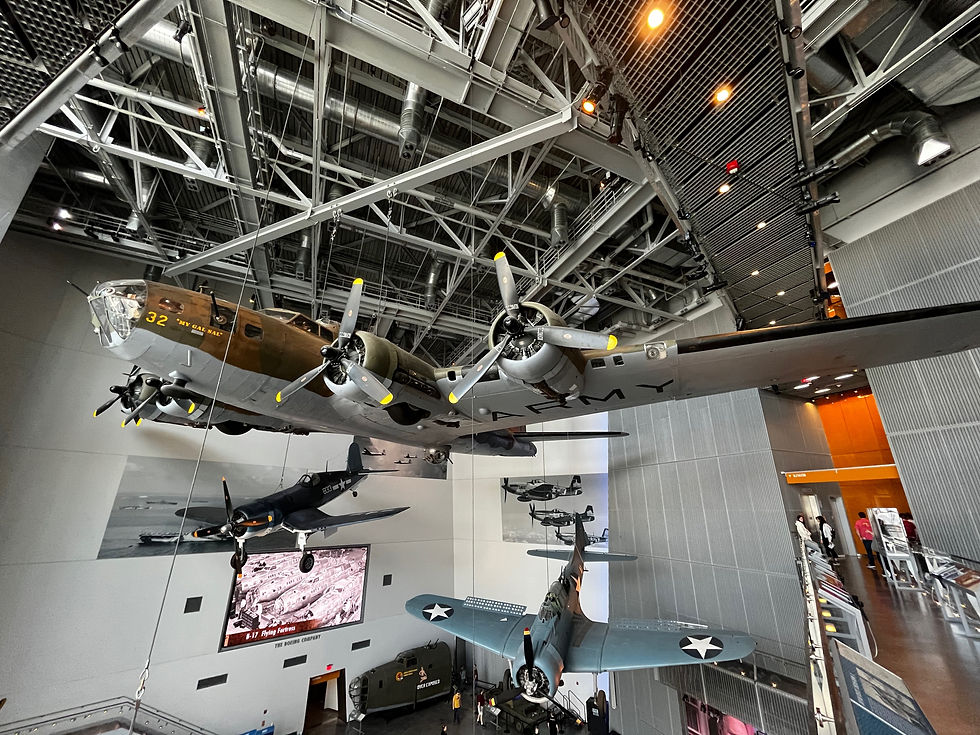War in Rememberance
- uniquejt
- Apr 1, 2024
- 3 min read
As we traveled west back to Texas for the solar eclipse on April 8, we passed through Louisiana for four days. Our first stop was at Fairview-Riverside State Park in Madisonville, Louisiana for two of the four nights. Its 99 acres is set along the banks of the Tchefuncte River. The park has 100 campsites, a short nature trail, and a boardwalk which reveals forested wetlands.We arrived on Wednesday afternoon, March 27 and set up on site 40 for only $26.84 for 2 nights
with our discount. Louisiana state parks give a 50% discount to National Park Pass holders.

Thursday, March 28 we decided to spend the day in New Orleans and visit the National WWII Museum, formerly known as The National D-Day Museum, a military history museum located in the Central Business District of New Orleans, Louisiana, on Andrew Higgins Drive between Camp Street and Magazine Street. The museum focuses on the contribution made by the United States to Allied victory in World War II. Founded in 2000, it was later designated by the U.S. Congress as America's official National WWII Museum in 2004. The museum is a Smithsonian Institution affiliated museum, as part of the Smithsonian Institution's outreach program. The mission statement of the museum emphasizes the American experience in World War II.
The museum is located in part in the former Weckerling Brewery, designed by local architect William Fitzner, which was renovated and opened as the D-Day Museum on June 6, 2000, the 56th anniversary of D-Day, focusing on the amphibious invasion of Normandy. As the Higgins boats, vital to amphibious operations, were designed, built, and tested in New Orleans by Higgins Industries, the city was the natural home for such a project. Furthermore, New Orleans was the home of historian and author Stephen Ambrose, who spearheaded the effort to build the museum. Ambrose also wrote a book entitled D-Day in 1994, which describes the planning and execution of Operation Neptune, which was launched on June 6, 1944. The early emphasis of the museum on D-Day, the location of Higgins Industries, and Ambrose's connections to New Orleans were all factors in the museum being established in New Orleans.

Upon arriving, we waited in line to board a train. The train is a simulation exhibit that mimics the experience of soldiers going off to war. In the train, the interactive dog tag is used to determine which individual a visitor will be following. The information is provided by screens on the back of the bench seats. Once the short train journey has ended, visitors are encouraged to explore the museum in whichever way they may choose. The museum is extensive in detail and comprehensive to a level I have never seen before. We ended our visit with tickets for the 3 pm award-winning 4-D film, Beyond All Boundaries, narrated by Tom Hanks and shown in the Solomon Victory Theater. It gives the visitor an overview of the war on every front.

We walked for three hours and only saw a fraction of the exhibits available. The museum was a deeply moving experience for both Karen and I. Honestly, we were both emotionally exhausted at the end of the visit. The museum provided a profound perspective on the width and depth of this moment in history and its affects on our national identity and culture in a very personal way. I would strongly recommend everyone visit this museum, with this caveat. It is not a feel good experience but a sobering journey through a difficult historical period,

I thought I knew a fair amount concerning World War 2, but this experience truly helped me to get my head around the massive sacrifices made by ALL Americans from the totalitarianism of the 30's and 40's. This museum rocked my view to an emotional level I've only experience twice before in my life; my visit on-board the USS Arizona Memorial in Pearl Harbor and the Vietnam Memorial Wall in Washington D.C.
Recent Posts
See AllWe arrived at Kathryn Abbey Hanna Park in Jacksonville, Florida area after Karen's orthopedic appointment on Tuesday, March 25 and...

Comments